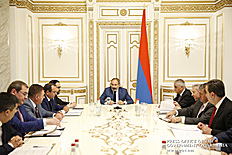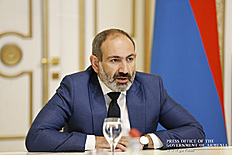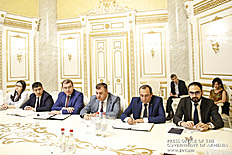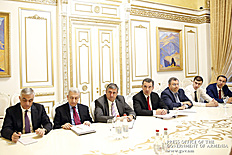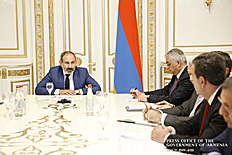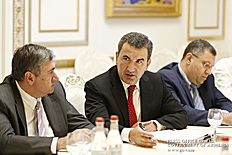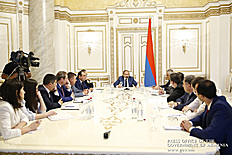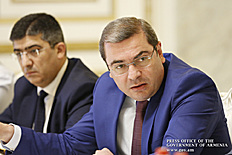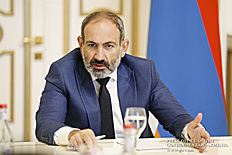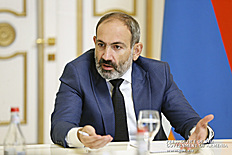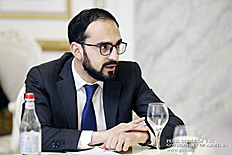Press releases
“There should be no cases of abuse of dominant position” - PM Pashinyan holds consultation on economic monopolies
more 8 photos
Chaired by Prime Minister Nikol Pashinyan, a consultation was held today to discuss issues of preventing abuses committed by companies with dominant market position, as well as ensuring fair competition.
“The topic of our today's discussion is what is called a monopoly in the Republic of Armenia - de facto or de jure, in this case it is not that important. Our economic policy is as follows: we intend to create an integrated and inclusive economic system in Armenia. What does it mean? This means that we fix the reality that prior to the velvet revolution in Armenia, certain economic activities were carried out with administrative decisions, de facto or de jure in this case is not important, and the opportunities for participation in these spheres were distributed among a limited number of people.
By saying integrated and inclusive economic system, we mean that people working in these areas should not be deprived of the opportunity to operate in these areas, but, on the contrary, that part of the activity that was entrusted to them by government decisions should be liberalized so that these people and all others could work in these areas. Of course, it is unequivocal that after the victory of the velvet revolution there are no political barriers to having such a situation in Armenia: all political obstacles have been eliminated, all conditions for an integrating system have been created.
I think that from time to time, we should monitor the situation in order to understand what is happening in the monopolized areas that are perceived as such in society, whether there is an actual change in the situation or not, and if there is no change, what measures should we take to really ensure real economic competition, accessibility markets not only de jure, but also de facto,” Nikol Pashinyan said.
Chairman of State Commission for Protection of Economic Competition Artak Shaboyan described in detail the processes taking place in recent months, the situation in the monopolized markets. In this regard, he touched upon the events in the markets of sugar, gasoline and bananas. In particular, he reported that until recently the main sugar supplier in Armenia was one company, but over the past two months, the number of importers and the volume of sugar imports increased significantly. As a result, the sugar price has decreased. At present, one kilogram of sugar costs 285 drams as compared with 390 drams registered early this year, that is, the price fell by 26 percent.
Coming to the gasoline and diesel fuel markets, the SCPEC chairman said there are 3-4 large companies in the given industry. Currently there are no obstacles whatsoever, and any business entity can import them. According to Artak Shaboyan, the main problem for companies entering the market in this area is related to infrastructures in terms of selling gasoline and diesel fuel. According to the SCPEC chairman, there is also a problem of fraud in the volumes of fuel sold, which creates unequal competitive conditions. There are some problems associated with diesel fuel standards.
With reference to the banana market, Artak Shaboyan stressed that until recently 90% of the market belonged to one company and its subsidiaries. Over the past two months, there has also been a significant increase in the number of importers and in the level of banana imports. As a result, the price of bananas has decreased at least twice in our country, and today it stands at 480 drams per kilo. Artak Shaboyan noted that the SCPEC will continue surveys in this area in order to identify possible anticompetitive actions.
Artak Shaboyan also presented details on the activities of large supermarkets and refueling stations, touching upon the current anticompetitive situation and the problems existing in these areas.
An interested exchange of opinions took place, various proposals were voiced, including on the possibilities of curbing monopolies and ensuring free competitive conditions through legislative regulations. It was said important for the Market Control Authority to take appropriate steps to address a number of problems, eliminate shortcomings, including at gas stations and refueling stations.
Prime Minister Pashinyan instructed the officials to discuss the proposals once again, come to specific conclusions and report back the findings. Summing up, the head of government stated in part: “There should be no monopolies or cases of abuse of dominant position, irrespective of the tools we may use. Our task is to remove the still existing market access barriers not only de jure, but also de facto. Before making statements, we first need to realize whether a regulation works in practice, or our statements and the reality stand in different dimensions. In this matter, I expect to see close cooperation between the State Commission for the Protection of Economic Competition, the State Revenue Committee, and all interested government departments.”
